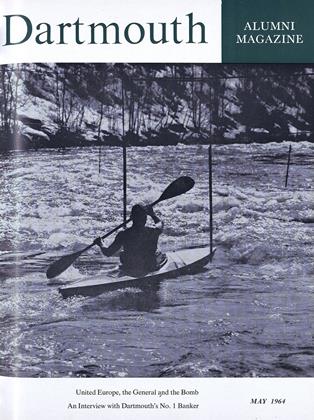Edited, with an introduction, by Jeffrey Hart '51. NewYork: Alfred A. Knopf, 1964. 374 pp. $3.95.
In 1788 a well-known dissenting minister, Dr. Richard Price, preached a sermon and earned himself a high place in the Valhalla of Naive Heroes. Celebrating the centennial of William III's accession to the throne of England in the so-called Glorious or Bloodless Revolution, he asserted that its principles and those of the French Revolution were similar. This preposterous bungling in the realm of ideas gave Burke his chance to point up the dangerous principles of the French Revolution which gave the Jacobins in 1798 their chance to be persuasive through tumbrils and scaffolds. Of all the political writers in the 18th Century, Burke seems closest to us today in his affirmations about political liberty, the right to choose officials and to make laws, and the right to determine the forms and functions of goverment.
Through Donald J. Greene's book, ThePolitics of Samuel Johnson (1960) we are also closer to Johnson than those who long held the belief that he was "a blind reactionary." That "simple old legend" simply will not stand up. This is not to say that Johnson is no longer the witty turner of paradoxes. But it is not the Hart purpose somehow to assemble the old favorites. In the Hart anthology, the Johnson selection, the pamphlet entitled The Patriot suggests that Johnson can elucidate his often misunderstood remark, "Patriotism is the last refuge of a scoundrel."
Dr. Hart seems to be slanting his book towards English Departments because of the high literary quality of his choices. The preface does say that he is giving samples based on three criteria: (a) value in illuminating the political issues of the period; (b) permanent significance for political thought; and (c) literary quality. But he adds that he hopes that all selections embody, though necessarily in different pro- portions, these three values. It may be only right, then, for broad-minded political scientists and historians to remark that the selections if seemingly slanted towards English majors are strikingly apropos of what government and history majors yearn to know and their professors to teach.
The book has some 60 pages of introduction, "From Locke to Burke," by Professor Hart, who knows what he is talking about and writes even better than the better English professors, who are the despair of the better sociologists. He contributes also a one-page introduction to each author. The five-page bibliography confines itself to works useful to discussion of authors in the anthology and to up-to-date and valuable lists of commentaries. Few in number, the authors, represented when possible by full rather than cut versions, are Locke, George Savile, Swift, Addison and Steele, Arbuth-not, Sir William Wyndham and Sir Robert Walpole, Bolingbroke, Wilkes, Goldsmith, "Junius," Johnson, Burke, and Paine.
Professor of English
 View Full Issue
View Full Issue
More From This Issue
-
 Feature
FeatureUNITED EUROPE, THE GENERAL AND THE BOMB
May 1964 By HENRY W. EHRMANN, -
 Feature
FeatureDARTMOUTH'S NO. 1 BANKER
May 1964 By DERO A. SAUNDERS '35, -
 Feature
FeatureA New Strategy of Liberal Learning
May 1964 -
 Article
ArticleTHE UNDERGRADUATE CHAIR
May 1964 By DAVE BOLDT '63 -
 Class Notes
Class Notes1936
May 1964 By BARRY C. SULLIVAN, GILBERT BALKAM -
 Class Notes
Class Notes1922
May 1964 By LEONARD E. MORRISSEY, CARTER H. HOYT
JOHN HURD '21
-
 Books
BooksEVERY DOG SHOULD HAVE A MAN.
December 1952 By John Hurd '21 -
 Books
BooksJOHN JAY, FOUNDER OF A STATE AND NATION.
MARCH 1969 By JOHN HURD '21 -
 Books
BooksBLUFF YOUR WAY IN THE CINEMA.
OCTOBER 1969 By JOHN HURD '21 -
 Books
BooksROSANJIN: 20th CENTURY MASTER POTTER OF JAPAN.
JUNE 1972 By JOHN HURD '21 -
 Article
ArticleFurther Mention
NOVEMBER 1972 By JOHN HURD '21 -
 Books
BooksBIG BUSINESS – YOUR LIFE WITHIN IT.
October 1974 By JOHN HURD '21
Books
-
 Books
BooksThe Charm of Scandinavia
June, 1915 -
 Books
BooksIDEAS, WEALS, AND AMERICAN DIPLOMACY: A HISTORY OF THEIR GROWTH AND INTERACTION.
OCTOBER 1966 By HERBERT W. HILL -
 Books
BooksGrape's Progress
SEPT. 1977 By MEL WAX '40 -
 Books
BooksDRIFTWOOD: MAINE STORIES.
April 1974 By ROBERT H. Ross '38 -
 Books
BooksPHILOSOPHY, SCIENCE, AND SENSE PERCEPTION.
OCTOBER 1965 By TIMOTHY J. DUGGAN -
 Books
BooksTHE AMERICAN AGRICULTURAL PRESS
April 1941 By W. R. Waterman


